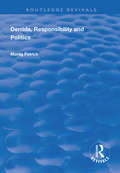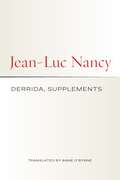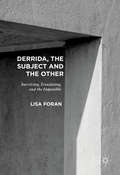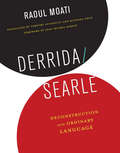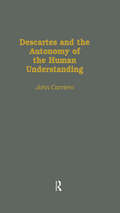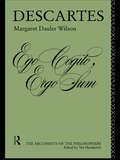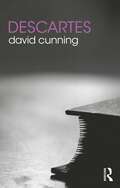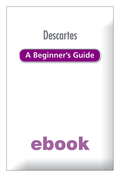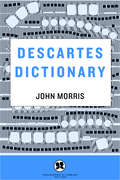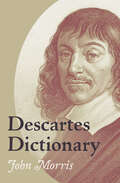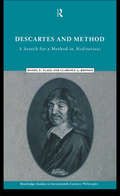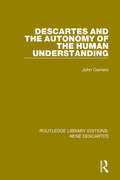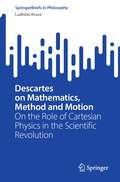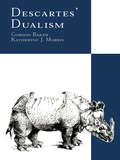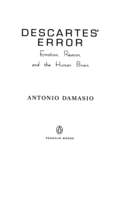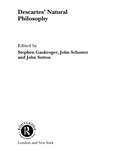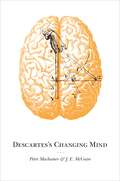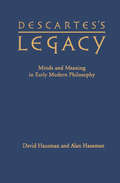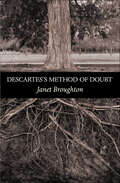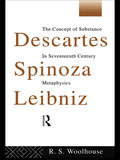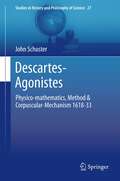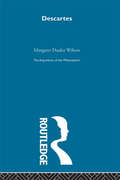- Table View
- List View
Derrida, Responsibility and Politics (Routledge Revivals)
by Morag PatrickPublished in 1997, Jacques Derrida's ’deconstructive method’ or ’deconstructionism’ is renowned as a species of anarchic free play, an antifoundationalism which can only end in a ruinous irrationalism and thereby the denial of all possibility of discrimination or judgement. In this book, Morag Patrick argues that far from having abandoned critique, Derrida's questioning of Western metaphysics responds to an ethical injunction, to a duty to recall the necessary incalculability of moral and political responsibility. In the first part of the study, Patrick examines the philosophical background to and the basic features of deconstruction. Derrida is located in a tradition of thinkers for whom the question of the possibility of philosophy is fundamental. The deconstructive endeavour is then explained as an attempt to secure a question that would further and transform thinking, a question that would no longer be philosophy's question. Patrick maintains that Derrida's strategy to this end is not anarchic, but rather adheres to strict protocols of reading. Subsequently, the ethical and political implications of this manner of reading are pursued. It is shown that if Derrida undermines the certainty with which we may assume moral and political responsibilities, if he establishes the essential excessiveness of responsibility, he does so in order to effect judgement and not to annul it.
Derrida, Supplements
by Jean-Luc NancyWhen Jean-Luc Nancy first encountered the work of Jacques Derrida in the 1960s, he knew he was hearing something new, a voice genuinely of its time. Thinking with and against each other over the course of their long friendship, the two thinkers reshaped the European intellectual landscape. Nancy’s writings on Derrida, collected in this volume, reflect on the elements of their shared concerns with politics, the arts, religion, the fate of deconstruction, and the future of sense. Rather than studies, commentaries, or interpretations of Derrida’s thought, they are responses to his presence—not exactly a presence to self, but a presence in the world.
Derrida, the Subject and the Other
by Lisa ForanThis book presents the relationbetween the subject and the other in the work of Jacques Derrida as one of'surviving translating'. It demonstratesthe key role of translation in thinking difference rather than identity,beginning with the work of Martin Heidegger and Emmanuel Levinas. It describes how translation, and its ethicaldemands, acts as a leitmotif throughout Derrida's writing; from his early work on Edmund Husserl to his lasttexts on politics and hospitality. While for both Heidegger and Levinastranslation is always possible, Derrida's account is marked by the challenge ofimpossibility. Expanding translation beyond a merely linguisticoperation, Foran explores Derrida's accounts of mourning, death and 'survival'to offer a new perspective on the ethics of subjectivity.
Derrida/Searle
by Jean-Michel Rabaté Timothy Attanucci Maureen Chun Raoul MoatiRaoul Moati intervenes in the critical debate that divided two prominent philosophers in the mid-twentieth century. In the 1950s, the British philosopher J. L. Austin advanced a theory of speech acts, or the "performative," that Jacques Derrida and John R. Searle interpreted in fundamentally different ways. Their disagreement centered on the issue of intentionality, which Derrida understood phenomenologically and Searle read pragmatically. The controversy had profound implications for the development of contemporary philosophy, which, Moati argues, can profit greatly by returning to this classic debate. In this book, Moati systematically replays the historical encounter between Austin, Derrida, and Searle and the disruption that caused the lasting break between Anglo-American language philosophy and continental traditions of phenomenology and its deconstruction. The key issue, Moati argues, is not whether "intentionality," a concept derived from Husserl's phenomenology, can or cannot be linked to Austin's speech-acts as defined in his groundbreaking How to Do Things with Words, but rather the emphasis Searle placed on the performativity and determined pragmatic values of Austin's speech-acts, whereas Derrida insisted on the trace of writing behind every act of speech and the iterability of signs in different contexts.
Derrida/Searle: Deconstruction and Ordinary Language
by Raoul MoatiRaoul Moati intervenes in the critical debate that divided two prominent philosophers in the mid-twentieth century. In the 1950s, the British philosopher J. L. Austin advanced a theory of speech acts, or the "performative," that Jacques Derrida and John R. Searle interpreted in fundamentally different ways. Their disagreement centered on the issue of intentionality, which Derrida understood phenomenologically and Searle read pragmatically. The controversy had profound implications for the development of contemporary philosophy, which, Moati argues, can profit greatly by returning to this classic debate. In this book, Moati systematically replays the historical encounter between Austin, Derrida, and Searle and the disruption that caused the lasting break between Anglo-American language philosophy and continental traditions of phenomenology and its deconstruction. The key issue, Moati argues, is not whether "intentionality," a concept derived from Husserl's phenomenology, can or cannot be linked to Austin's speech-acts as defined in his groundbreaking How to Do Things with Words, but rather the emphasis Searle placed on the performativity and determined pragmatic values of Austin's speech-acts, whereas Derrida insisted on the trace of writing behind every act of speech and the iterability of signs in different contexts.
Descartes
by John Cottingham Robert StoothoffPhilosophy is one of the most intimidating and difficult of disciplines, as any of its students can attest. This book is an important entry in a distinctive new series from Routledge:The Great Philosophers. Breaking down obstacles to understanding the ideas of history's greatest thinkers, these brief, accessible, and affordable volumes offer essential introductions to the great philosophers of the Western tradition from Plato to Wittgenstein. In just 64 pages, each author, a specialist on his subject, places the philosopher and his ideas into historical perspective. Each volume explains, in simple terms, the basic concepts, enriching the narrative through the effective use of biographical detail. And instead of attempting to explain the philosopher's entire intellectual history, which can be daunting, this series takes one central theme in each philosopher's work, using it to unfold the philosopher's thoughts.
Descartes & the Autonomy of the Human Understanding (Harvard Dissertations in Philosophy)
by John CarrieroThis volume, originally published in 1990, delineates the transition Descartes effects from a prevalent medieval conception of understanding to a modern conception of it. Through the examination of the continuities and discontinuities between Descartes' account of the understanding and that of high scholasticism, a characterization emerges of two way in which the understanding is autonomous in Descartes' view. These two sorts of autonomy shed light on the origin of a set of related concerns that give modern philosophy its coherence, setting it apart from medieval philosophy as a distinct tradition. The first sort - the independence of the understanding of the senses - creates the modern problem of scepticism with regard to the external world. The second sort, concerning the ontological status of the mind, provides the background against which modern discussions of the mind/body problem take shape.
Descartes (Arguments of the Philosophers)
by Margaret Dauler WilsonOne of the most significant studies of Descartes in recent times. It concentrates on the Meditations to show Descartes' philosophy in the context of his overall scientific objectives, not all of them fully explicit in the texts.
Descartes (The Routledge Philosophers)
by David CunningRené Descartes (1596–1650) is well-known for his introspective turn away from sensible bodies and toward non-sensory ideas of mind, body, and God. Such a turn is appropriate, Descartes supposes, but only once in the course of life, and only to arrive at a more accurate picture of reality that we then incorporate in everyday embodied life. In this clear and engaging book David Cunning introduces and examines the full range of Descartes’ philosophy. A central focus of the book is Descartes’ view that embodied human beings become more perfect to the degree that they move in the direction of finite approximations of independence, activity, immutability, and increased knowledge. Beginning with an introduction and a chapter on Descartes’ life and works, Cunning also addresses the following key topics: Descartes on the wonders of the material universe skepticism as epistemic garbage, and the easy dissolution of hyperbolic doubt Descartes’ three arguments for the existence of God the ontology of possibility and necessity freedom and embodiment arguments for the immateriality of mind sensible bodies and the pragmatic certainty by which to navigate them Descartes’ stoic view on how best to live. Descartes is an outstanding introduction to one of the greatest of Western philosophers. Including a chronology, suggestions for further reading, and a glossary of key terms, it is essential reading for anyone studying Descartes and the history of modern philosophy.
Descartes A Beginner's Guide (ABEG)
by Kevin O'DonnellThis useful guide introduces the reader to the so-called 'father of modern philosophy' - Rene Descartes.
Descartes Dictionary
by John MorrisThe purpose of this Descartes Dictionary is to bring together as many as possible of the technical and special terms in Descartes' writings with their definitions in Descartes' own words. There are also implicit characterizations of the meanings of many words, and a handful of entries were included simply for their own sake--because Descartes had something interesting to say about his life and world. All of the entries, or almost all of them, have been newly translated for this volume. There are many reasons for preparing new translations: the language in the older translations is archaic and often inaccurate; many of Descartes' most important works have never been translated into English; and modern translations vary in quality and style. What is most important, though, is that the old translations simply failed to pay attention to the technical language that Descartes used, and so blurred some of the most important distinctions that he made. Professor Morris is on the faculty of Kirkland College.
Descartes Dictionary
by John MorrisAn accessible guide to understanding many of the complex technical and special terms implemented by the seventeenth-century philosopher. French philosopher René Descartes authored many works in his lifetime like Discourse on the Method and Principles of Philosophy. But while his &“I think, therefore I am&” may be easy to grasp, much of the terminology he uses can be challenging. Descartes would frequently introduce terms in his writings without explanation, and if there were such a definition, it is in one of his letters or an obscure, unpublished work. In Descartes Dictionary, author John M. Morris collects as many as possible of the technical and special phrases Descartes employed in his writings along with their definitions in Descartes&’s own words. This volume is a great companion book for anyone studying the philosopher&’s works and will certainly enrich their understanding.
Descartes and Method: A Search for a Method in Meditations (Routledge Studies in Seventeenth-Century Philosophy #Vol. 2)
by Daniel E. Flage Clarence A. BonnenRene Descartes credited his success in philosophy, mathematics, and physics to the discovery of a universal method of inquiry, but he provided no systematic description of his method. Descartes and Method carefully examines Descartes' scattered remarks on his application and puts forward a systematic account of his method with particular attention to the role it plays in the Meditations.Daniel E. Flage and Clarence A. Bonnen boldly and convincingly argue against the orthodox conception that Descartes had no method. Through a rigorous and thorough examination, Flage and Bonnen unearth and explain the role of the method of analysis in the Meditations.Descartes and Method is a ground-breaking book that is sure to make a considerable impact on the philosophy community. Anyone wishing to gain a new understanding of Descartes's Meditations should read this book.
Descartes and the Autonomy of the Human Understanding (Routledge Library Editions: Rene Descartes)
by John CarrieroThis volume, originally published in 1990, delineates the transition Descartes effects from a prevalent medieval conception of understanding to a modern conception of it. Through the examination of the continuities and discontinuities between Descartes’ account of the understanding and that of high scholasticism, a characterization emerges of two way in which the understanding is autonomous in Descartes’ view. These two sorts of autonomy shed light on the origin of a set of related concerns that give modern philosophy its coherence, setting it apart from medieval philosophy as a distinct tradition. The first sort – the independence of the understanding of the senses – creates the modern problem of scepticism with regard to the external world. The second sort, concerning the ontological status of the mind, provides the background against which modern discussions of the mind/body problem take shape.
Descartes on Mathematics, Method and Motion: On the Role of Cartesian Physics in the Scientific Revolution (SpringerBriefs in Philosophy)
by Ladislav KvaszThis book argues that Descartes’ physics was a milestone on the road to modern mathematical physics. After Newton introduced a completely different approach to mathematical description of motion, Descartes’ physics became obsolete and even difficult to comprehend. This text follows the language of Descartes and the means of which motion can be described. It argues that Descartes achieved almost everything that later Newton was able to do—to describe the motion of interacting bodies- by different (i.e. algebraic) means. This volume completely refutes the received view according to which Descartes’ physics was merely a kind of discursive natural philosophy. To make this interpretation more plausible the book follows Descartes’ ideas from his early work in mathematics, through his invention of the analytic method towards his mature physics. It shows that Descartes followed a similar heuristic pattern.The volume appeals to students and researchers; it invites the reader equippedwith minimal understanding of college mathematics to follow Descartes on his intellectual journey through the Scientific Revolution. The reader will gain a deeper understanding of the role of mathematical language in the creation of modern physics and a glimpse into the fascinating world of Descartes’ scientific thought. Several of Descartes’ philosophical ideas can be traced back to his scientific interests and thus the book elucidates the motivation behind some of Descartes’ key positions in the area of epistemology and method. In the penultimate chapter the book presents four arguments in favor of seeing Descartes as a physicist on par with Galileo and Newton.
Descartes' Dualism: Null
by Gordon Baker Katherine MorrisWas Descartes a Cartesian Dualist? In this controversial study, Gordon Baker and Katherine J. Morris argue that, despite the general consensus within philosophy, Descartes was neither a proponent of dualism nor guilty of the many crimes of which he has been accused by twentieth century philosophers.In lively and engaging prose, Baker and Morris present a radical revision of the ways in which Descartes' work has been interpreted. Descartes emerges with both his historical importance assured and his philosophical importance redeemed.
Descartes' Error: Emotion, Reason, and the Human Brain (Drakontos Ser.)
by Anthony DamasioSince Descartes famously proclaimed, "I think, therefore I am," science has often overlooked emotions as the source of a person's true being. Even modern neuroscience has tended, until recently, to concentrate on the cognitive aspects of brain function, disregarding emotions. This attitude began to change with the publication of Descartes' Error in 1995. Antonio Damasio--"one of the world's leading neurologists" (The New York Times)--challenged traditional ideas about the connection between emotions and rationality. In this wondrously engaging book, Damasio takes the reader on a journey of scientific discovery through a series of case studies, demonstrating what many of us have long suspected: emotions are not a luxury, they are essential to rational thinking and to normal social behavior.
Descartes' Meditations
by Karen DetlefsenDescartes's Meditations, one of the most influential works in western philosophy, continues to provoke discussion and debate. This volume of original essays by leading established and emerging early modern scholars ranges over all six of the Meditations and explores issues such as scepticism, judgement, causation, the nature of meditation and the meditator's relation to God, the nature of personhood, Descartes' theory of sense perception, and his ideas on the nature of substance. The contributors bring new insights to both central and less-studied topics in the Meditations, and connect the work with the rich historical and intellectual context in which Descartes forged his thought. The resulting volume will appeal to a wide range of scholars of early modern thought.
Descartes' Natural Philosophy (Routledge Studies in Seventeenth-Century Philosophy #Vol. 3)
by John Schuster Stephen Gaukroger John SuttonThe most comprehensive collection of essays on Descartes' scientific writings ever published, this volume offers a detailed reassessment of Descartes' scientific work and its bearing on his philosophy. The 35 essays, written by some of the world's leading scholars, cover topics as diverse as optics, cosmology and medicine, and will be of vital interest to all historians of philosophy or science.
Descartes's Changing Mind
by Peter Machamer J. E. McGuireDescartes's works are often treated as a unified, unchanging whole. But in Descartes's Changing Mind, Peter Machamer and J. E. McGuire argue that the philosopher's views, particularly in natural philosophy, actually change radically between his early and later works--and that any interpretation of Descartes must take account of these changes. The first comprehensive study of the most significant of these shifts, this book also provides a new picture of the development of Cartesian science, epistemology, and metaphysics. No changes in Descartes's thought are more significant than those that occur between the major works The World (1633) and Principles of Philosophy (1644). Often seen as two versions of the same natural philosophy, these works are in fact profoundly different, containing distinct conceptions of causality and epistemology. Machamer and McGuire trace the implications of these changes and others that follow from them, including Descartes's rejection of the method of abstraction as a means of acquiring knowledge, his insistence on the infinitude of God's power, and his claim that human knowledge is limited to that which enables us to grasp the workings of the world and develop scientific theories.
Descartes's Legacy
by Alan Hausman David HausmanDebates current in the philosophy of mind regarding the gathering and processing of information, and the nature of perception and representation, also animated some of the most important figures in early modern philosophy, among them Descartes, Hume, and Berkeley. The authors of Descartes's Legacy: Minds and Meaning in Early Modern Philosophy use certain problems in contemporary information theory to elucidate the concerns of the early modern philosophers. This critical study attempts to uncover what was once called the logic of the theory of ideas, and to explore the questions it was meant to solve, given the limits of the ontological categories available. The authors begin their discussion of Descartes by examining his response to established models of perception in light of his understanding of the contemporary new science. Since Descartes proposed that any likeness between representation and the thing represented was unreliable, what was his solution to how an internal representation, an idea, gives us information? The authors' central claim is that Descartes's answer to the problem of how the mind knows matter involves a theory of 'intentional ideas.' This provocative divergence from recent discussions of Descartes's philosophy of mind, which have revolved around whether he is a 'realist' or a 'representationalist,' leads the authors to consider the idealism of Hume and Berkeley in light of Descartes's notion of the intentional. Hume and Berkeley, they maintain, explored alternatives to Descartes's conception, which led them to abandon traditional notions of meaning and truth. Descartes's Legacy concludes by suggesting that Descartes's picture can be reconciled with twentieth-century materialism, and asking whether the philosophy of mind can live without a primitive notion of the intentional.By shedding light on Descartes's crucial ontological innovation and on Hume's and Berkeley's reactions to it, the authors of Descartes's Legacy have repositioned early modern philosophy within a truly contemporary framework.
Descartes's Method of Doubt
by Janet BroughtonDescartes thought that we could achieve absolute certainty by starting with radical doubt. He adopts this strategy in the Meditations on First Philosophy, where he raises sweeping doubts with the famous dream argument and the hypothesis of an evil demon. But why did Descartes think we should take these exaggerated doubts seriously? And if we do take them seriously, how did he think any of our beliefs could ever escape them? Janet Broughton undertakes a close study of Descartes's first three meditations to answer these questions and to present a fresh way of understanding precisely what Descartes was up to. Broughton first contrasts Descartes's doubts with those of the ancient skeptics, arguing that Cartesian doubt has a novel structure and a distinctive relation to the commonsense outlook of everyday life. She then argues that Descartes pursues absolute certainty by uncovering the conditions that make his radical doubt possible. She gives a unified account of how Descartes uses this strategy, first to find certainty about his own existence and then to argue that God exists. Drawing on this analysis, Broughton provides a new way to understand Descartes's insistence that he hasn't argued in a circle, and she measures his ambitions against those of contemporary philosophers who use transcendental arguments in their efforts to defeat skepticism. The book is a powerful contribution both to the history of philosophy and to current debates in epistemology.
Descartes, Spinoza, Leibniz: The Concept of Substance in Seventeenth Century Metaphysics
by Roger WoolhouseThis book introduces student to the three major figures of modern philosophy known as the rationalists. It is not for complete beginners, but it is an accessible account of their thought. By concerning itself with metaphysics, and in particular substance, the book relates an important historical debate largely neglected by the contemporary debates in the once again popular area of traditional metaphysics. in philosophy. (Do Not USE)
Descartes-Agonistes
by John SchusterThis book reconstructs key aspects of the early career of Descartes from 1618 to 1633; that is, up through the point of his composing his first system of natural philosophy, Le Monde, in 1629-33. It focuses upon the overlapping and intertwined development of Descartes' projects in physico-mathematics, analytical mathematics, universal method, and, finally, systematic corpuscular-mechanical natural philosophy. The concern is not simply with the conceptual and technical aspects of these projects; but, with Descartes' agendas within them and his construction and presentation of his intellectual identity in relation to them. Descartes' technical projects, agendas and senses of identity shifted over time, entangled and displayed great successes and deep failures, as he morphed from a mathematically competent, Jesuit trained graduate in neo-Scholastic Aristotelianism to aspiring prophet of a systematised corpuscular-mechanism, passing through stages of being a committed physico-mathematicus, advocate of a putative 'universal mathematics', and projector of a grand methodological dream. In all three dimensions--projects, agendas and identity concerns--the young Descartes struggled and contended, with himself and with real or virtual peers and competitors, hence the title 'Descartes-Agonistes'.
Descartes-Arg Philosophers (Arguments Of The Philosophers Ser.)
by Margaret Dauler WilsonFirst Published in 1999. Routledge is an imprint of Taylor & Francis, an informa company.
